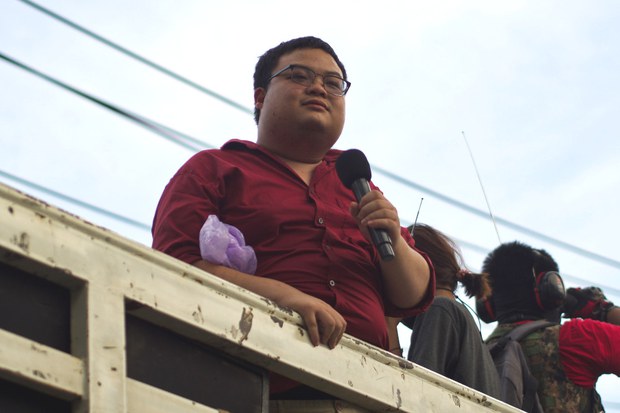Thai Activist on Hunger Strike will not Accept ‘Justice System’
2021.04.19
Bangkok
 Parit “Penguin” Chiwarak speaks from the back of a truck during a rally outside the 11th Infantry Regiment in Bangkok, Nov. 29, 2020.
Parit “Penguin” Chiwarak speaks from the back of a truck during a rally outside the 11th Infantry Regiment in Bangkok, Nov. 29, 2020.
Thai activist Parit Chiwarak appeared in court in a wheelchair Monday, looking extremely frail after a 35-day hunger strike, and telling officials he had been unable to gather evidence for his defense against sedition and royal-defamation charges because he was repeatedly denied bail, eyewitnesses said.
Parit, a university student and prominent figure in youth-led pro-democracy protests that sprang up here last year, had to be wheeled into the Bangkok Criminal Court for the closed-door hearing on charges related to a Nov. 13, 2020, incident at the Democracy Monument. It led to royal defamation charges being filed in February against him and six other anti-government protesters.
In March, Parit announced his hunger strike, vowing to fast on water, syrup and milk until the court would grant bail to all the defendants.
“Parit addressed in the court that he missed the opportunities to acquire evidence because he is denied bail. He is not accepting the justice system,” Krisadang Nutcharus, a lawyer from Thai Lawyers for Human Rights (TLHR), which had been representing Parit in court through Monday, said after the hearing.
Krisadang said Parit would be moving on without his legal assistance. He noted that, on April 9, the defendant had announced his plan to dismiss the lawyers representing him.
“The plaintiff can continue the investigation, but two other lawyers and I will withdraw. The reason is that the lawyers are not able to help his case at all,” Krisadang said.
Another TLHR lawyer questioned actions by corrections officers in the courtroom.
“The atmosphere in the court was unusual. Many correctional officers were present and stood alongside the defendant,” said Yaowalak Anuphan, leader of the TLHR team.
“The defendant was not allowed to speak with lawyers or relatives. After the lawyer wrote a note, a correctional officer pulled the note out of the lawyer’s hand without asking for permission,” Yaowalak said.
Mother’s concern
Parit’s mother, Sureerat Chiwarak, who was in the courtroom, said he had lost more than 20 kg (44 pounds).
“His hands were shaking while he was addressing the court. He had to sit down to gather his thoughts before answering the court,” Sureerat told reporters. “He must have lost all of his energy, but he pretended to be strong so I would not be worried.
“But I know that he is doing badly, sitting in a wheelchair while getting IV fluids. He could barely stand up straight,” Sureerat said. “He showed signs of extreme fatigue and looked extremely frail.”
The TLHR lawyers said Sureerat offered to produce 200,000 baht (U.S. $6,400) if her son were granted bail on his 11th application, so he could be treated at a hospital. The court rejected the offer as it had done for all previous requests, and did not set a date for the next hearing.
Krisadang said the lack of bail had other negative effects on Parit’s life, pointing out that parents and friends from Thammasat University told the court that the student activist was having trouble completing his studies. Parit has missed several exams and could be forced to drop out.
Since their first rally in mid-July 2020, pro-democracy demonstrators have protested for three demands to be addressed – for Prime Minister Prayuth Chan-o-cha to step down, for the Constitution to be amended and for the monarchy to be reformed. Their three-fingered salute, borrowed from The Hunger Games movies, is a symbol for these demands.
Parit and a group of other organizers including Panusaya “Rung” Sithijirawattanakul, Panupong “Mike” Jadnok, Jatupat “Pai” Boonpattararaksa and Arnon Nampa, have faced charges related to those protests and have been jailed since February.
Lese-Majeste
The activists are accused of violating Lese-Majeste, the strict royal defamation law stipulated under Article 112 of the Thai criminal code. Prior to November 2020 when Prayuth announced the law would be enforced for the first time in about two years, authorities had filed charges of sedition against the protesters.
Authorities have filed at least 86 charges of violating Lese-Majeste, including 79 against at least 20 activists linked to the protests. Lese-Majeste carries a sentence of up to 15 years for each conviction.
The Thai justice system draws criticism within and outside the country because defendants are being detained without trial, contradicting the universal human rights principle, according to Salai Bawi, a political analyst at Chiang Mai University.
“This process is wrong from the beginning. Penguin and other activists have not been proven guilty and therefore they should not be sent to prison,” Salai told BenarNews, using Parit’s nickname.
“It is wrong according to the basic human rights principle and the rule of law. What is even worse is that the hunger strike of Penguin and Rung does not put pressure on the Thai justice system.”
On March 31, Rung, Parit’s fellow activist, announced her own hunger strike on March 31.
Yostorn Triyos in Bangkok contributed to this report.







